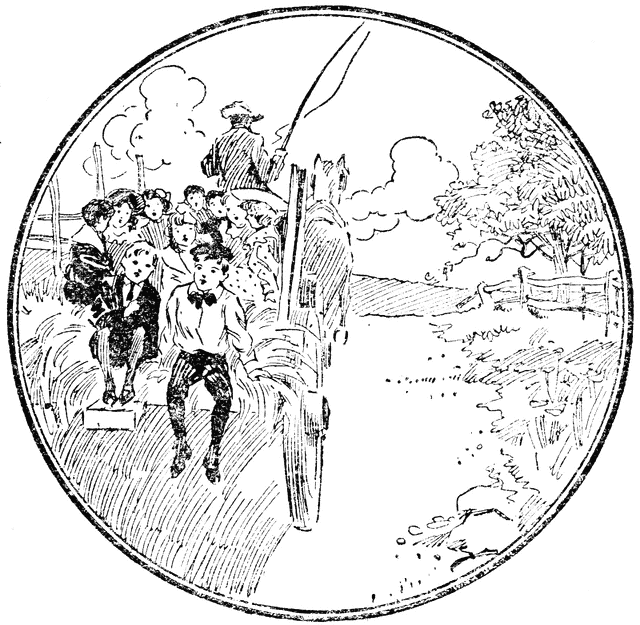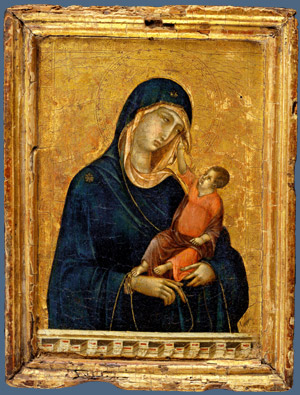When I was in my teens, every December a group of families would get together for a horse-drawn, jingle-belled hayride through the streets of our suburban New Jersey town. The farmer, whose name I have forgotten, would hand out song sheets.
Everyone in that hay-filled wagon sang. Really, really loud. Loudness, not musicality, was key. And if we passed anyone in the street, we were supposed to yell, “Howdy, Neighbor!”
 |
| It wasn't *that* long ago, but you get the idea. |
I just learned the phrase “trigger warning” this week. If you have experienced the loss of an infant, suffered a miscarriage or stillbirth, you may want to skip the rest of this post.
The Coventry Carol is, in fact, a lullaby. But when I researched the medieval carol’s history, I learned that it is not about Mary and baby Jesus. This is a different mother and child story, tragic in its own way.
Here, it is performed by the Westminster Cathedral Choir.
The Coventry Carol
Lully, lulla, thou littell tine childe,
By by lully lullay, thou littell tyne child,
By by lully lullay!
By by lully lullay, thou littell tyne child,
By by lully lullay!
O sisters too,
How may we do,
For to preserve this day
This pore yongling,
For whom we do singe
By by lully lullay.
How may we do,
For to preserve this day
This pore yongling,
For whom we do singe
By by lully lullay.
Herod the king,
In his raging,
Chargid he hath this day;
His men of might,
In his owne sight,
All yonge children to slay.
In his raging,
Chargid he hath this day;
His men of might,
In his owne sight,
All yonge children to slay.
That wo is me,
Pore child for thee,
And ever morne and say;
For thi parting,
Nether say nor sing,
By by lully lullay.
The Coventry Carol was first published in the 16h Century. It comes from a medieval
mystery play (The Pageant of the Shearmanand Tailors), dating to the 1400s or even earlier. The carol refers to a story from
the Gospel of Matthew, the Slaughter of the Innocents.Pore child for thee,
And ever morne and say;
For thi parting,
Nether say nor sing,
By by lully lullay.
In Bethlehem, fearful of prophecies about a newborn king, Herod has decreed that all male children under the age of two be put to death. The carol is sung by a mother, saying goodbye to her baby boy.
| A fifth century Roman mosaic of the Biblical story. |
Right now, I am working on a non-fiction project, researching an event from my family’s history. My middle brother and I were born three years apart. Between us, there should have been a sister. I say “should have” because the baby died at 36 weeks gestation.
During my first pregnancy, 16 years ago, I found myself writing poems to this baby, expressing my own fears about motherhood. Now, I am trying to piece together the story of her death, which was entwined with my own early life. How did it happen? How did it affect the young woman who was already my mother?
When I hear the Coventry Carol today, I think of my own mother, coping with the death of her child. “Nether say nor sing,/ By by lully lullay.”
According to Wikipedia, the authorship of the carol has been lost. What we have is copies of copies, late transcriptions that call some of the phrasing into doubt. But the lyrics still speak to a profound sense of loss. They combine the comfort of a lullaby with a mother’s grief.
 |
| Madonna and Child circa 1300. |
Wikipedia points out the last verse “’And ever morne and may For thi parting Neither say nor singe’ is not clear. Various modern editors have made different attempts to make sense of the words, so that you may find such variations as ‘ever mourn and say’, ‘every morn and day’, ‘ever mourn and sigh.’”
I am learning more,
now, about stillbirth – how it was handled in the late 1960s
as a non-event, something to "get over."
Since women’s healthcare reform in
the 1970s, stillbirth is recognized as a death. It is understood, today, that
women who suffer stillbirth may “ever mourn” “every morn and day,” unless their
grief is treated with compassion. Families today may opt to have
services or keep a memento of the child, such as a footprint or clipping of hair.
If you would like information about stillbirth or pregnancy loss, there is a list of support groups here:
If you would like information about stillbirth or pregnancy loss, there is a list of support groups here:
And a group that
provides photos and other mementos here: http://www.joshuasboxes.co.uk/
Here are some links, if you’d like more information on the history of this beautiful carol:
http://en.wikipedia.org/wiki/Coventry_Carol
http://edgoldfarbmusic.com/the-strange-historys-mystery-of-coventry-carol/
http://suite101.com/article/medieval-christmas-carols-pt--1-a10552
Sad as it was learning the origins of this carol, researching its rich history has made me appreciate the song even more.
As Hanukkah begins this weekend and we enter the heart of the winter holiday season, I wish you love and light.

13 comments:
A beautiful post. Thanks for sharing the carol and your research and thinking about it and your own story.
liz
Fascinating backstory about the carol -- I'd assumed it was Mary and baby Jesus all along, too. Guess I should have listened more closely to the lyrics. Your nonfiction project sounds very interesting!
Love to imagine you singing in a hay wagon! Sounds like a fun time :-) Your story about this carol surprised me -- I didn't see Herod coming. You inspired me to look up a song that has been going through my head the past few days: "Beautiful Star of Bethlehem." It was published in 1940, and seems to have been written by R. Fisher Boyce, but when he sold it, he didn't get any later royalties and sometimes not attribution which makes its history confusing.
Good luck with your family project.
I accidentally deleted Marjorie (Paper Tigers) comment. Sorry! Here it is...
I sang a beautiful four-part female voice arrangement of the Coventry Carol last week-end. I've always thought of it as being about the Slaughter of the Innocents rather than immersed in it, so thank you for sharing this information and its roots in The Pageant of the Shearmanand Tailors - I will have to read it now.
Losing a child at 36 weeks must have been truly devastating for your mother and indeed your father, especially since, as you say, in the '60s stillbirth was treated like a non-event. I hope that your research brings deep healing.
I've always liked the Coventry Carol, so I'm glad you spotlighted its background and meaning! As a parent, I can certainly identify with the loss the mother would soon be experienceing.
I didn't know that about this carol either! Thank you for sharing your mother's story. I particularly noticed this part: "O sisters too, How may we do, for to preserve this day..." It seems to me that talking to "sisters" is one of the best ways of healing. When I had an early miscarriage, I found comfort in talking to other women who had experienced the same kind of loss.
You singing in a hay wagon = joy! Thank you for sharing this and also addressing a really important issue. Also, be looking for post cards! Put them in the mail yesterday. xo
This was beautiful and gave me goosebumps. Thank you, Laura!
This is another post that I read this morning and has stayed with me all day. Thanks for your thoughtfulness in presenting the topic, Laura, and for this history. Loved hearing the choir.
And I loved the story about your jingle-belled hayrides!
Hi, Everyone. I have been out all day -- part of it judging a Poetry Out Loud competition! -- and apologize for responding late.
I appreciate each one of you who read the post, left a comment, and in many chases reached out and share a story of your own.
As Ruth said, there is comfort in talking to others about grief. I'm also grateful to my mother for realizing this -- so many years after she lost a baby. She is working with me on the book in hopes that it will help other mothers and fathers.
Tabatha -- I'm so glad the post inspired you to do a little research. No matter what the subject, it seems there is always more we can know and understand.
Irene -- Thank you! I can't wait for the cards. Wrote the second poem this week.
Wow.
Just
wow.
Post a Comment